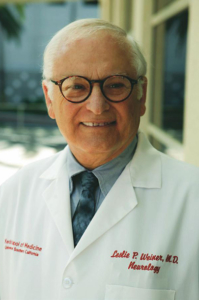
Leslie P. Weiner
One of the transformative leaders of neuroscience at the Keck School of Medicine of USC has taken his last bow. Leslie Weiner, MD, retired June 30 after spending 41 years at the university, including 23 as chair of the Department of Neurology. HSC News sat down with the self-described “neurologist, physician, scientist and teacher” recently to hear how the school has changed and his plans after retirement. The conversation has been edited for length and clarity.
Question: How has the Keck School changed since you’ve been here?
Answer: It’s a totally different place. When I came here in 1975, the university hospital didn’t exist and outpatient practice didn’t exist. When I took over as chairman, I started a faculty practice with Don Skinner (MD) in urology, Art Donovan (MD) in surgery and Dan Mishell (MD), who recently died, in obstetrics and gynecology. These were prominent achievements in 1979.
Q: Tell me about your research career. What projects were most exciting for you?
A: I developed a vaccine for multiple sclerosis (MS), which we tested and failed. That was a six- or seven-year endeavor, and that was a very exciting time — but disappointing. We’ve been involved in a number of clinical trials for MS in recent years, which have been fun. My biggest clinical feeling is that in 1997, there were no treatments for MS. Now there are 14 licensed treatments, so MS is a treatable disease in the sense that you can prevent progression and attacks and so forth. It’s not a cure, but it’s such a different world for those patients now.
Q: Tell us about why you chose to retire now.
A: I just turned 80, and it was time for me to go. It’s been a good 41 years. But I’m in good health and there are lots of things I would like to do. I tell everybody that the reason I’m retiring is so I can watch Netflix all day. My wife originally was not in favor of this, but she’s warmed to the idea.
Q: What are you planning on watching?
A: We usually hook onto something and then power-watch it. I just finished watching Murdoch Mysteries, I enjoy Outlander and I was watching Columbo last night. But we like foreign films, too. We spend my birthday in March in Paris every year but I don’t speak French, so I need subtitles.
Q: How would you like to be remembered?
A: I don’t care how I’m remembered. Well, I have an endowed chair with my name on it, the neurology clinic has my name on it. I think that you’re always remembered by your students and your patients, but I just don’t care. My feeling is that you do the best if you’re remembered as someone who took care of patients and taught.
Q: Do you have any advice to share from your career?
A: I think the only advice I have is for the clinicians. They have to recognize their individual patients and their patients’ needs, and they frequently don’t have time to do that. That’s a difficulty. My only regret is how medicine has changed. I think that it is a technologically driven phenomenon, which has its benefits, but I think that when the clinician sits in front of the computer instead of the computer instead of talking to his patient, that just galls me. … But overall I’m very proud of neurology and the medical school. This is a good place, it’s got a good heart and I think it’s important that its message has not been lost. It still considers the training of physicians who care for patients as its primary goal.
— Melissa Masatani

